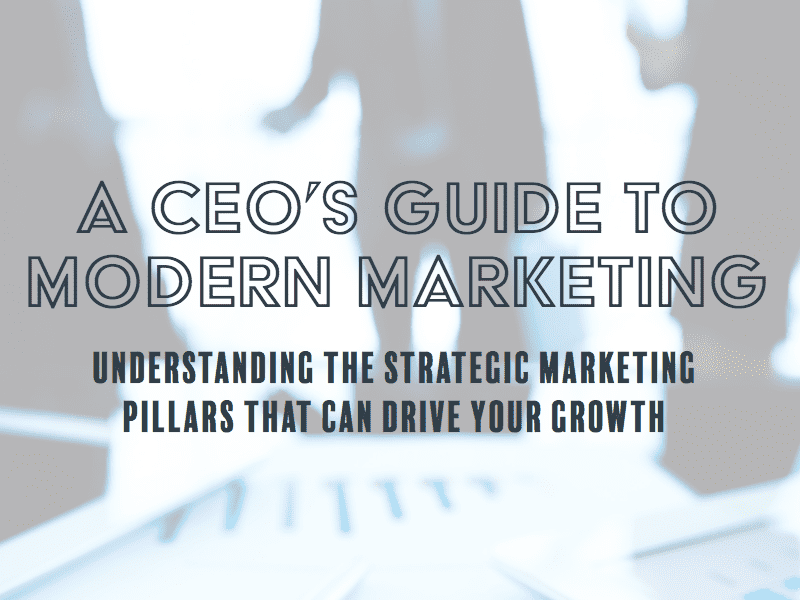How A Sector-Based Marketing Strategy Can Accelerate Your Revenue Growth
When you’re trying to generate a steady pipeline of leads that convert to customers, it might seem counterintuitive to narrow your marketing focus. Don’t you want as many leads as possible?
All B2B CEOs love to grow. But not all CEOs like to focus their growth. And why should they? If your company brings value through exceptional products and services, you should want every buyer to have them…right?
Maybe not.
In a digitally driven, borderless world you’ll always find companies that offer services similar to yours AND are experts in certain sectors. If you don’t specialize, you aren’t very special (unless you compete on price, and who wants to do that?). Ironically, failing to focus stymies the very growth B2B CEOs seek.
As many B2B companies have discovered, narrowing your marketing focus to a handful of sectors can open the pipeline and drive greater revenue growth than taking a scattershot approach.
It’s What Your Buyers Expect
I was introduced to sector-based marketing back in Y2K as an employee of KPMG Corporate Finance, when the company assigned each geographic region one sector to focus its sales and marketing on. I’ve been a big believer ever since.
The idea behind sector-based marketing is simple: Choose a small number of industries that your company can serve effectively and focus your marketing and sales efforts there. It’s common in professional services businesses, but it can be relevant and successful for many product-based companies, including SaaS businesses.
With today’s buyers seeking a hyper-relevant, hyper-personalized experience—and the Internet breaking down the geographic barriers that once limited your competition—it’s never been more vital to show buyers you’re uniquely qualified to solve their industry-specific problems. The more you understand their sector-specific challenges, the better you’ll convince them you have a relevant solution they can’t do without.
It might even allow you to punch above your weight.
We’ve helped boutique companies compete very well against bigger rivals by focusing on sectors where they have a distinct advantage. Whether you’re a SaaS business targeting the healthcare sector or an investment banking firm courting technology businesses, this approach can help you generate a predictable pipeline of leads and drive revenue growth—even if you don’t have the same resources as much larger competitors.
Sector-Based Marketing Mistakes to Avoid
Deciding to adopt a sector-based marketing approach can be a great first step for professional services businesses. Unfortunately, many fail to execute on that decision successfully due to these common pitfalls.
Not Being Selective Enough
One of the biggest mistakes you can make with sector-based marketing is not narrowing your focus enough. I’ve seen small services firms with 12 professionals profess to specialize in 12 different industries. That’s not feasible, and your buyers know it.
If you’re serious about accelerating your growth, limiting the number of target sectors can seem too restrictive. But to be clear: It doesn’t mean you’ll turn down work that comes your way if it’s the right fit. It just means you won’t allocate resources to market to buyers outside your chosen sectors.
Choosing Sectors for the Wrong Reasons
Another common pitfall is using the wrong criteria when deciding which sectors to target. Often, companies choose sectors a particular partner likes (arbitrary), or industries they already have clients in (not necessarily the best long-term targets) or areas where they want to get a foothold but don’t have expertise yet (aspirational).
So, what IS the right reason to choose a sector? One of the most important factors is expertise. If you claim to specialize in an industry, buyers will assume you have deep expertise there. You can’t fake it, either. (More about that later.)
Once you’ve narrowed your options, take time to analyze the makeup of each market you’re considering. Is it large or small, growing or contracting, fragmented or consolidated, emerging or mature? Is it saturated with competitors or relatively untapped?
All other things being equal, it’s easier to compete in a market that’s growing and where no single competitor has a large share. If you’re targeting smaller companies, a fragmented market might be a good place to compete; but if you’re going after middle market companies, you might do better in a more consolidated market, where there are fewer, larger potential customers for providers to compete for. And while a saturated market is a tough playing field, if it’s a good fit otherwise, then you could do well by carving out a lucrative niche there.
Not Following Through
It’s one thing to declare your intention to focus on certain sectors; it’s another to create and execute an effective sector-based marketing plan.
A successful plan starts with securing buy-in from the internal subject matter experts (SMEs) who have direct experience in each market. They need to be comfortable and committed to
serve as the face of your brand with this sector—the thought leaders who are uniquely qualified to share insights and solve customer problems.
Companies that are most successful with sector-based marketing form internal teams for each industry, leveraging the knowledge and experience of the professionals who live and breathe this sector. Your outsourced marketing partner will collaborate with these focused teams to develop and execute your strategic plan.
A critical part of any sector-based plan is showcasing points of credibility that prove to buyers you’re truly an expert in their industry. Besides assessing your industry expertise through your blogs, guides, and other content, buyers will want evidence that you’ve served customers in this space already, in the form of case studies, testimonials, and reviews.
Not Being Visible Enough
Relevant content is critical for sector-based marketing, but relevance alone isn’t enough. With some marketers leaning heavily on AI tools like ChatGPT for content development, authenticity is going to become more important than ever. In the absence of a unique point of view, it will become obvious when there’s just a bot, not a person, behind industry-specific content.
Your buyers want insights gleaned from your SMEs’ personal experience in the trenches. That’s how you stand out from machine learning-generated content and demonstrate your value.
Not Seeing It Through
It takes time and patience to develop and execute a sector-based marketing plan. You can’t just pop up some pay-per-click ads and hope for the best. But if you plant the right seeds in the right places and cultivate them, you’ll reap a great outcome.
One of our clients made a strategic decision to target family-owned businesses. We developed and executed a marketing plan to support this strategy. The client’s SMEs became certified in this sector and created a family-owned business alliance, pulling together service providers across various disciplines. Over time, the firm became known as THE regional experts in serving family-owned businesses.
Professional services firms, SaaS businesses, and other B2B companies turn to Marketri for outsourced marketing that drives predictable, profitable growth. We’ll help you determine if sector-based marketing is the right approach to achieve your goals—then develop and execute a strategic plan that delivers exceptional results.
To learn how Marketri can unlock your growth potential and drive high ROI, schedule a call with our CEO Deb Andrews.





